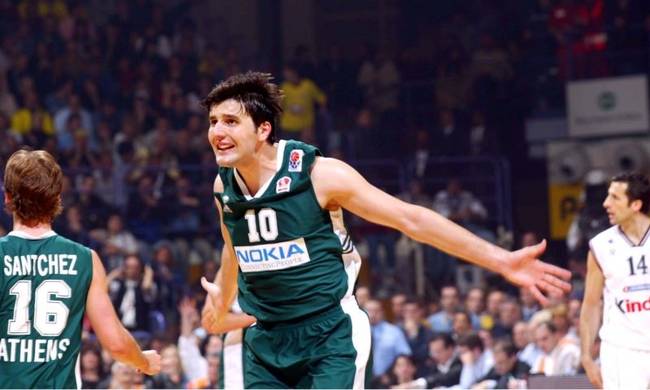After some exciting TOP16 we reached the first four final of the ULEB era, which was held in the Italian city of Bologna. In the semifinals we would find an Italian duel between the local VIRTUS BOLONIA against the BENETTON and on the other hand a mythical duel between the PANATHINAIKOS and the MACCABI, being with this the third time that they faced in a consecutive way.
The Italian semifinal was faithful to what was expected, two teams that knew each other perfectly. The Virtus had the same team that had been champion a year before with Rigaudeau, Ginobili, Jaric and the immense Griffith and therefore they had a very trained game. In front Benetton had a team led by Edney, Bell, Nachbar and Garbajosa. At the end of the third quarter came with (63-63), only in the final stretch the Virtus could sentence.
Curcic – 3p, 2r.
In a superb and contested final, Panathinaïkós have become the second Euroleague champion, and their victory has prevented the Virtus from renewing the title they won last year, despite the fact that the Italian team was the favourite and also played at home. With this victory, on the other hand, Željko Obradović becomes part of the European basketball legend, as he becomes the continent’s most successful coach with five titles (achieved with four different teams): Partizan, Joventut de Badalona, Real Madrid and Panathinaïkós), ahead of the four of Pedro Ferrándiz and Božidar Maljković.
The match began with Kinder domination, which in the first two quarters made a superb match, defending at a high level and attacking with patience and mastery (especially successful were the Italians from the perimeter, with a total of seven three pointers). Manu Ginóbili had a spectacular first quarter in which he scored 11 points. The excellent defense of Panathinaïkós allowed the score to be equal during this first period (23-23), although the exit in tromba of Kinder at the beginning of the second quarter, with three consecutive three pointers, began to make differences (23-32). In fact, the Bolognese’s excellent outside play was mainly due to the intimidating presence of power forward Rashard Griffith in the Greek zone, who took advantage of the multiple help his defenders received to double balls to their perimeter teammates in privileged positions. The versatility of the Slovenian power forward Matjaž Smodiš (author of 13 points in this second quarter, with three pointers) was another factor that motivated a huge upheaval in the Greek defence, until then insurmountable. In this vein, the Bolognese squad reached a maximum advantage of thirteen points (27-40) that seemed very dangerous for the Panathinaïkós. However, the attacking protagonism of Dejan Bodiroga and İbrahim Kutluay in the final stretch of the second quarter prevented the game from breaking completely (40-48).
At the start of the third quarter, Smodiš scored four consecutive points that foreshadowed continuity in the dominance of Kinder. But the situation began to change when the young Greek center Lazaros Papadopoulos sent Griffith to the bench with 3 personal fouls and began to dominate the boards, which made the Panathinaïkós was placed only one point (51-52). At that moment there was the definitive emergence of a star Dejan Bodiroga (MVP of the final). The Yugoslavian base-alero-pivot is the alter ego of Obradović on the track, as it brings the necessary serenity to the game of his team and always seems to make the right decision at the right time. Nine points consecutively turned the match (60-57). The tables changed from that moment and Kinder went from dominator to dominated, although the contribution of Manu Ginóbili (27 points) and Marko Jarić (11 points and 5 assists) prevented the Greeks escape definitively. A few minutes before the end, Panathinaïkós had an eight-point advantage (80-72) that seemed definitive, although the push and the Kinder caste led them to get only two down (82-80) with two free throws in their favour with 1’09» to spare. However, Sani Bečirovič missed his two throws and Kutluay put the final lace with a triple with 45 seconds to go. The Panathinaïkós knew how to amortize his greater experience and mettle in the final and decisive instants of the match to rise to victory.
